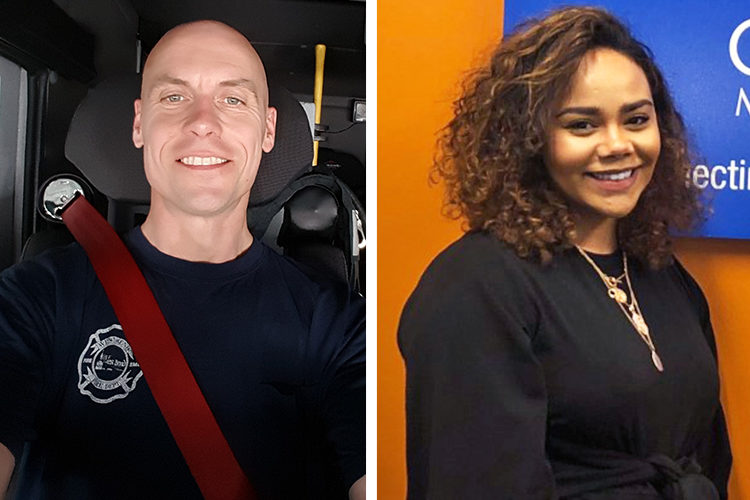Two students in UWM’s Zilber School of Public Health are among those working on the front lines of the coronavirus pandemic, the greatest public health crisis of our times.
Rob Schafer is a 21-year-veteran paramedic in West Bend and a death investigator for the Washington County Medical Examiner’s Office. Alexandria Kohn is an administrative assistant, working second and third shifts, at a methadone clinic operated by Community Medical Services in West Allis.
Both say what they’ve learned in their public health courses is helping in their work on the job.
“I’ve spent time trying to convince my co-workers at the firehouse and my colleagues at the Medical Examiner’s Office that paramedicine and death investigation are integral parts of public health,” said Schafer. “Now it seems like a pandemic has finally done the convincing for me.”
The work of the methadone clinic is vital to keeping its clients drug-free and avoiding a spike in opioid deaths, Kohn said. “I think people don’t understand the health impacts if we do close down. We have over 700 clients that dose every day, and if we take that service away the risk of withdrawing or relapsing is extremely high.”
Balancing jobs and school
Kohn, whose master’s degree focus is on Community & Behavioral Health Promotion, is planning to graduate in May 2021. Schafer is on the same track and plans to graduate in May 2020.
It is tiring working two jobs while continuing his academic work online, Schafer said, but he sees all three working together.
“Public health is the option that unified what I’ve learned as a paramedic, what I’ve learned and practiced as a death investigator,” Schafer said, “putting all that together and impacting health care for the living.”
His studies of infectious diseases, for example, have made him aware of the safety precautions he and his co-workers need to follow. In fact, just before the epidemic really exploded, he read two published studies through his Zilber research that discussed how long the virus lived on surfaces, and he shared that information with his colleagues. Not much was generally available at that point, he said.
Wakeup call
In his early years as a paramedic, Schafer recalled, he wore often wore gloves, a mask and goggles, but over the years he and fellow paramedics had become more complacent. Now he sees the equipment as vital, not just for coronavirus but for flu and other infectious diseases.
“It’s refocused paramedics back to the basics of infection control and protecting yourself from infectious diseases,” he said. “The way you protect yourself is the same, except coronavirus is virulent and more dangerous. We should take those precautions regularly.”
The paramedics are also taking other precautions, he added. “We used to rush in with three of us and equipment piled on a stretcher.” Now dispatchers ask questions, following Centers for Disease Control and Prevention guidelines. Paramedics still move quickly, but in situations involving illness may send in only one person first to ask questions about potential exposure to the virus.
“It’s made us more thoughtful in analyzing situations before we act,” Schafer said. “It’s difficult because we are conditioned to rush into the building. We have to slow down and do it critically and quickly so we don’t take those unnecessary health risks.”
The death investigation system developed in the last six years in Washington County is also proving useful, Schafer added. Working closely with the Washington Ozaukee Public Health Department, the investigators can help with epidemic surveillance and identification of those who have died of suspected coronavirus who were not tested before death. If there is a strong possibility coronavirus was involved, the investigators can send out for a post-mortem test. This is being done through private labs to keep public testing facilities available for living patients, Schafer said.
Parents inspire career path
Both of Kohn’s parents work in hospitals, which inspired her to go into public health to learn more about root causes of health problems. Originally from Illinois, she chose UWM for its small class sizes and mission of social justice. Her course studies at Zilber help her in working with patients who come to the center.
“Not only do we provide medication, but also counseling for the patients,” Kohn said. “We’re working closely with people who often have severe mental health issues. Tying in bits and pieces of what I’ve learned in epidemiology and the root causes – the systemic issues – helps connect my academics and my work.”








